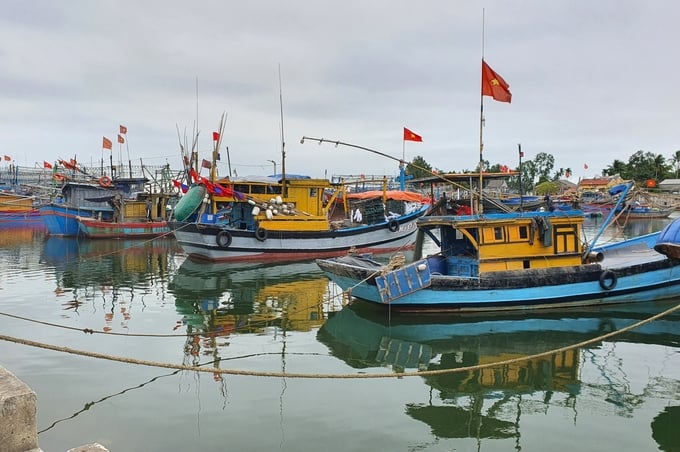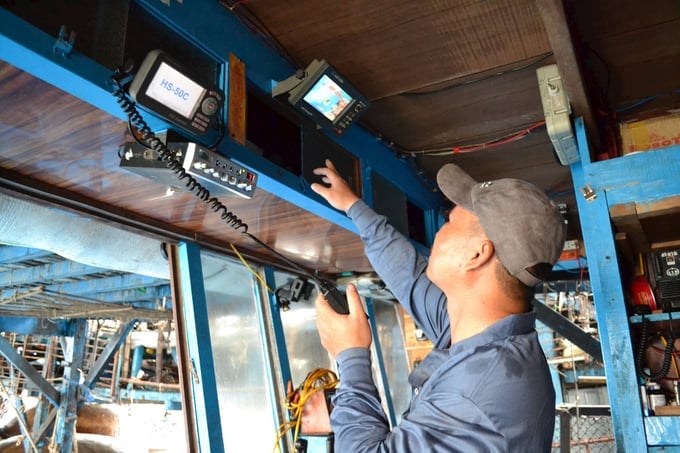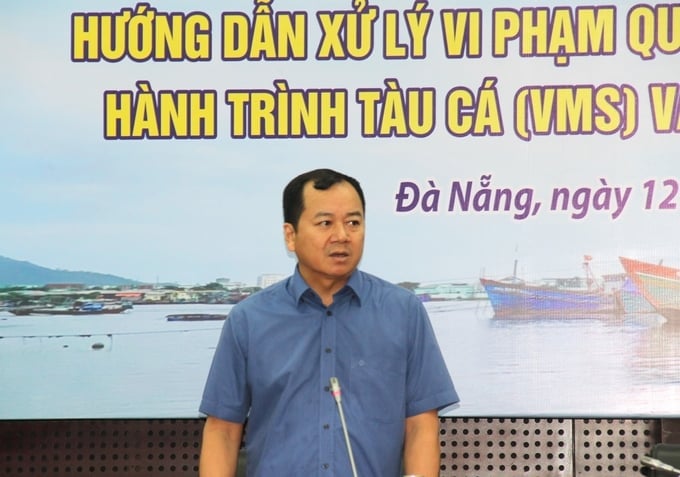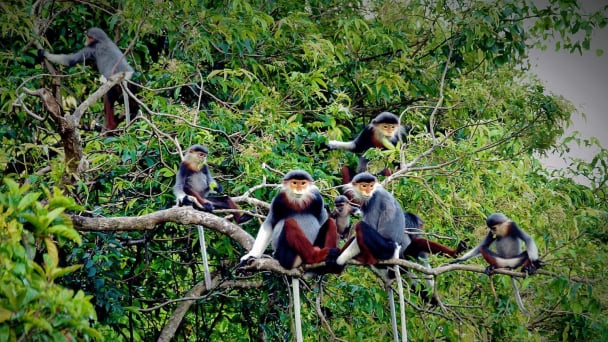May 17, 2025 | 19:06 GMT +7
May 17, 2025 | 19:06 GMT +7
Hotline: 0913.378.918
May 17, 2025 | 19:06 GMT +7
Hotline: 0913.378.918

The majority of fishing vessels measuring over 15 meters in length in Vietnam are currently equipped with a vessel monitoring system. Photo: L.K.
The Directorate of Fisheries under the Ministry of Agriculture and Rural Development, in collaboration with Da Nang city's Department of Agriculture and Rural Development, organized a conference on June 12 to provide instructions on the handling of violations pertaining to the vessel monitoring system (VMS) and the implementation of the Electronic Catch Documentation and Traceability system (eCDT).
Following the fourth inspection, the European Commission (EC) noted that Vietnam had achieved nearly total compliance in equipping fishing vessels measuring over 15 meters in length with a vessel monitoring system. However, Vietnam's fisheries sector faces several persistent issues, including: frequent disconnection of the vessel monitoring system; challenges in origin tracing for caught fishery products; and fishing vessels' infringement of foreign waters.
Furthermore, local governments have failed to address the frequent and large-scale disconnection of vessel monitoring systems, with verification and penalties remaining limited. Notably, dismissed violations due to insufficient evidence is unconvincing, and often results in ineffective implementation of legal regulations.

Fishing vessels with a disconnected vessel monitoring system is a recurring and common problem across multiple regions nationwide; however, the rate of penalties is limited. Photo: L.K.
Nguyen Van Muoi, General Director of Quang Ngai province's Sub-Department of Fisheries, stated that local efforts to penalize fishing vessels that disconnect their vessel monitoring system encounters several difficulties. In addition to the disconnection of VMS, the management and monitoring of caught fishery products and the traceability of Vietnamese seafood are inadequate.
In response to these challenges, the Directorate of Fisheries has developed and implemented the Electronic Catch Documentation and Traceability system (eCDT). This system will integrate and synchronize data on the operations of fishing vessels; control the volume of caught fishery products; and manage the verification and certification of origin at fishing ports, Sub-Departments of Fisheries, and seafood purchasing, processing, and exporting businesses. This initiative aims to maintain the transparency and legality of exported seafood products.

Tran Dinh Luan, General Director of the Directorate of Fisheries, urged local governments and relevant agencies to closely coordinate in addressing IUU fishing violations. Photo: L.K.
Regarding violations in the verification and certification of caught fishery product origin, stakeholders will conduct thorough investigations and take drastic actions to ensure deterrence. Notably, relevant parties will take actions against the "fish laundering" cases discovered during the fourth inspection of IUU-violating export shipments to the European market. These violations involve T&H Co., Ltd., Thinh Hung Co., Ltd., Cat Tien Co., Ltd., and other related fishing ports, organizations, and individuals.
Tran Dinh Luan, General Director of the Directorate of Fisheries, emphasized that the eCDT system has been introduced at various fishing ports, and will continue to be refined and uniformly deployed nationwide. Vessel owners will be encouraged to utilize the traceability software on tablets. Additionally, fishing ports and provincial Sub-Departments of Fisheries will support businesses in using said software to integrate data, thereby promoting transparency.
Regarding the disconnection of vessel monitoring systems, General Director Luan expects local governments in coastal regions to share their experiences in penalizing and categorizing fishing vessels, including the total number of inactive vessels, to formulate suitable solutions. On the other hand, fishing vessels operating at sea must strictly comply with regulations.
General Director Luan emphasized, "IUU teams at fishing ports should notify relevant local governments when a violating vessel docks at other locations, thereby maintaining coordinated inspections and consistent enforcement across all ports. Vessels on the risk list or those reported for violations should undergo strict inspections, with cooperation from marine law enforcement agencies such as the Border Guard, Coast Guard, and Fisheries Surveillance, to ensure strict legal compliance."
According to a report from MARD, the Ministry, as the permanent agency of the National Steering Committee on IUU, sent a delegation to Belgium to meet the Directorate-General for Maritime Affairs and Fisheries (DG MARE), which is a part of the European Commission, from April 22 to April 26. The delegation aimed to address the issue of illegal, unreported, and unregulated fishing activities and discuss the removal of the EC's "yellow card". Additionally, the delegation provided a report on the implementation results of the EC's recommendations after the fourth inspection in October 2023.
The Commission acknowledged and commended Vietnam's efforts in implementing its recommendations after the fourth inspection in October 2023. Namely, Vietnam made significant progress in completing its legal framework, improving fishing fleets, enhancing origin traceability, and strengthening penalties for illegal, unreported, and unregulated fishing violations.
Translated by Nguyen Hai Long

(VAN) The United Nations designated 22 May as the International Day for Biodiversity 2025 with the theme 'Harmony with nature and sustainable development.'
![Multi-channel, multi-directional Vietnamese agricultural markets: [8] A national strategy is needed](https://t.ex-cdn.com/nongnghiepmoitruong.vn/608w/files/phucpm/2025/05/15/1435-thi-truong-nong-san-viet-da-kenh-da-huongbai-8-can-mot-chien-luoc-quoc-gia-084750_728.jpg)
(VAN) The Chairman of Hung Nhon Group shared: ‘Opening up and tapping into new markets is the right and strategic direction for Vietnam's agricultural sector.’

(VAN) Food waste has become a serious issue in modern society, especially in rapidly urbanizing and developing cities like Hanoi.
![Multi-channel, multi-directional Vietnamese agricultural markets: [7] Deep processing makes global reach easy](https://t.ex-cdn.com/nongnghiepmoitruong.vn/608w/files/huytd/2025/05/16/2946-che-bien-sau-chia-khoa-vang-nang-tam-nong-san-viet-tren-ban-do-the-gioi-080603_110-093858.jpg)
(VAN) The application of deep processing technology is helping Vietnamese agricultural products enhance their value, create competitive advantages, and open doors to conquer global consumers.
![Multi-channel, multi-directional Vietnamese agricultural markets: [6] Agri products go online](https://t.ex-cdn.com/nongnghiepmoitruong.vn/608w/files/content/2024/12/10/1-113313_954.jpg)
(VAN) Bringing agri products onto e-commerce platforms is an effective way to build a brand that many businesses, cooperatives, and agricultural production households are doing.

(VAN) Veterinary training should focus on quality, not just quantity. Veterinarians also need more options to pursue specialized training.

(VAN) The veterinary industry needs to be viewed objectively and further invested in to properly demonstrate its role and importance in the new context.